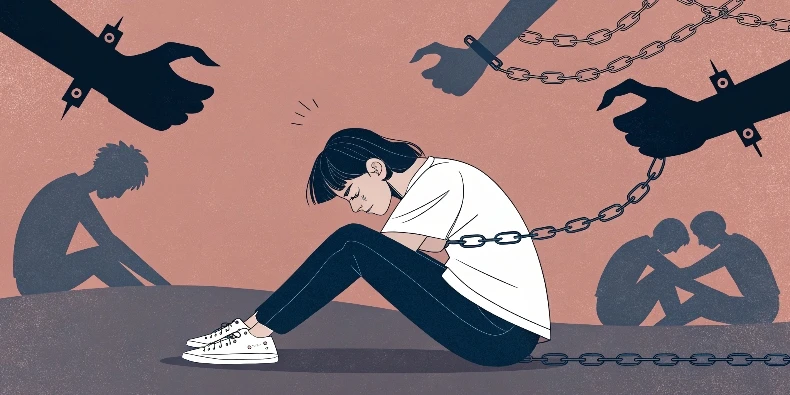Abuse is a way of manipulating and controlling another person, which can manifest in many different forms. It’s not always direct violence—often, it takes the form of verbal insults, humiliation, mockery, or phrases meant to make the victim feel weak and helpless. At the same time, words and expressions that may seem ordinary at first glance can, in the mouth of an abuser, carry a much deeper and more destructive meaning than they initially appear to.
Understanding abuse
Abuse is a form of violence built on control and manipulation. It can be overt and aggressive, or subtle and disguised—yet no less destructive. One of the abuser’s key tools is verbal abuse: words that are masked as care or love, but in reality, erode the victim’s confidence and foster dependency.
Typical manipulative phrases like “I love you” or “You should be grateful for everything I’ve done for you” may sound warm on the surface. But in the context of abuse, they carry a different message: to instill guilt, undermine self-worth, and isolate the person from outside support. It’s a tactic designed to make the victim dependent, controllable, and unable to resist.
Awareness in these moments is crucial. The sooner we learn to recognize the language of abuse, the better our chances of breaking free from toxic dynamics before they take root.
List of common abusive phrases
Abusers often use language as a tool for pressure, control, and psychological domination. Behind seemingly harmless words may hide toxic beliefs meant to undermine the victim’s self-confidence and tie them emotionally to the abuser. Below is a list of abusive phrases commonly found in destructive relationships.

- “It’s your fault” — an attempt to shift responsibility and convince the victim that everything bad is happening because of them.
- “I can’t live without you” — a phrase that plays on guilt, trapping the victim with fear for the other person’s well-being.
- “You’re too sensitive / emotional / weak” — emotional invalidation that makes the victim question their own sanity.
- “No one will ever love you like I do” — a classic gaslighting phrase, deepening dependency and cutting off external support.
- “If I hit you, it means I love you” — a crude attempt to justify violence under the guise of “love.”
- “If you loved me, you would…” — emotional manipulation that turns love into a tool of control.
- “You’re crazy / there’s something wrong with you” — undermines self-esteem and discredits the victim’s perception of reality.
- “It’s all in your head” — deliberate verbal abuse aimed at invalidating pain and emotions.
- “If you leave me, I’ll kill myself” — emotional blackmail meant to make the victim feel responsible for someone else’s life.
- “You should be grateful for what I do for you” — instills a sense of debt for minimal expressions of care.
- “I need you more than you need me” — fosters emotional dependency and guilt.
- “I won’t let you go” — a threat disguised as “care,” used to trap someone in a relationship.
- “Don’t talk to me” — a control tactic that shuts down dialogue and silences the victim.
- “You’re nothing without me” — creates a feeling of worthlessness and helplessness.
- “I can’t believe you did this to me” — an accusation that destabilizes and induces self-doubt.
- “You won’t survive without me” — fear dressed up as “concern,” used to crush any attempt at freedom.
These abusive phrases are not just words — they are weapons. They leave no bruises, but they destroy from within. Their purpose is to control, intimidate, and suppress. That’s why recognizing gaslighting, manipulation, and guilt-tripping is essential — and refusing to accept them as truth is the first step to breaking free.
Understanding these phrases doesn’t just reveal the core of toxic behavior — it helps you begin to establish boundaries. Because no amount of “I love you” is worth losing yourself to emotional dependency.
How to recognize verbal manipulation and respond effectively
Manipulation in communication isn’t always about shouting or direct threats. More often, it hides in phrases that sound calm or even caring — but subtly erode your confidence, instill guilt, and make you doubt yourself.

Pay close attention to manipulative phrases in relationships that are disguised as “concern” or “common sense,” but actually serve a controlling agenda. For example:
- “You should” or “You must” — demands masked as polite requests.
- “You’re wrong,” “You don’t know what you’re talking about” — invalidate your opinion.
- Demeaning remarks, backhanded compliments, or comments that shame your appearance, intelligence, or personality.
This kind of pressure is a form of verbal manipulation. It may not trigger immediate resistance, but over time, it can break down your boundaries and self-esteem.
What to do if you notice manipulative language
- Call it out. Stop speech that harms you. Say things like: “I don’t like hearing that,” “Don’t speak to me in that tone,” or “Please don’t use those words — they’re hurtful.” Don’t justify or downplay your feelings.
- Step away if pressure builds. Sometimes, the best response is silence and distance. Go for a walk, call someone you trust, or take a break. This gives you space to reflect without reacting emotionally.
- Document what’s happening. It can be helpful to write down what was said and how it made you feel. This not only clarifies your own thoughts, but also helps you notice recurring patterns of pressure or boundary violations.
- Talk to someone you trust. Don’t carry it alone. A conversation with a therapist, a close friend, or a mentor can give you an outside perspective and emotional support — especially when you struggle to put your experience into words, but feel that you’re being manipulated.
Understanding how manipulation through language works is the first step in protecting yourself. Recognizing these tactics early on helps you stop the pressure before it causes serious psychological harm. You have the right to respectful, healthy communication — and that’s where the journey toward inner freedom begins.



